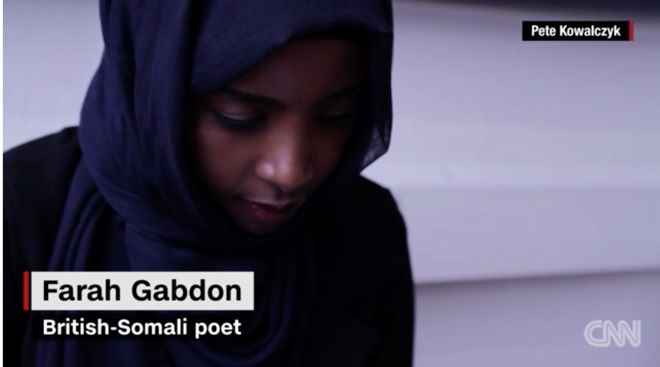
Thursday February 23, 2017
By Pete Kowalczyk
(CNN) When Beyoncé dropped her album "Lemonade" in April last year, it blew up the Internet and went platinum around the world. But for Somali poets across the diaspora it symbolized the rise of their art into the mainstream.
Queen Bey interlaced her album with passages of poetry from Warsan Shire, a former Young Poet Laureate of London. A British-Somali poet now based in Los Angeles, Shire weaves together the frictions and contradictions of diasporic life and the pain of leaving your roots behind.
As she puts it in her poem "home": "No one leaves home unless / home is the mouth of a shark." She continues: "You only leave home / when home won't let you stay."
Driven by a connection to a ravaged homeland and the search for self in unfamiliar surroundings, these sentiments underpin an entire generation of young millennial artists coming of age across the Somali diaspora right now.
One quick search on YouTube throws up hundreds of videos of young poets talking about their connection to Somalia in Canadian, Swedish or US vernaculars, among many others. These videos reach tens of thousands of people around the world. Artists such as Canadian Hamda Yusuf use TED Talks to broadcast pithy opinions on modern identity, while teenagers rap on the streets of Minnesota lamenting "a loss of respect for their mothers' ways.”
British-Somali poet Farah Gabdon is a leading light of this poetry movement, performing for organizations such as the Finnish League for Human Rights and posting to thousands of online fans. In her late 20s, she was raised in England, yet inexorably is linked to her motherland.
"The war destroyed a lot of Somali culture," Gabdon said. "Not just culture, but the expression of it.
"I think it was very traumatic. They lost everything.”
Back in Somalia, Gabdon's grandfather was a poet and her dad was a published fiction writer. Then in 1991, the country became engulfed in civil war. More than half the population fled, including Gabdon's family. Poetry got left behind.
But right now, something strange is happening. Members of the diaspora generation are starting to reconnect with their roots. They're starting to talk openly about the effect war and displacement has had on their art and their people's sense of self. Their work is questioning what it means to be a young Somali in 2016.
"I think most of the writing from Somalis in the diaspora is about identity and connecting and finding a place where you fit in," Gabdon said.
"It's my story, but I'm also aware that my story is the same as a lot of other people's," she said. "And I want to tell it in the best possible way through poetry.”
Faisal Salah is a 23-year-old British-Somali musician using art to explore his roots and identity. He's at the vanguard of this new wave of Somali poets creating an alternative narrative about their homeland.
"When people see Somalia, we've got all this crap about us," Salah said. "Piracy, extremism, Al-Shabaab. Broken state, Black Hawk Down, Captain Phillips. All of these different things are how we're represented now.
"But for me it's about the nation, the heart and the spirit of the people back home," he said. "Connecting to that, and preserving it in some ways -- it plays such a huge part of who we are."
Like many Somali families, Salah's parents were granted asylum in west London. And like many, they found it hard to adjust. His mother tried to raise the family, while his father struggled to support them.
By exploring his roots through his art, Salah started to find kindred spirits online. These days he performs before tens of thousands at concerts across Europe and in Australia and Indonesia.
"I feel like there's something crucial about this time, in this globalized society," Salah said. "We (the diaspora) know we're not alone now, we can reach out to each other.
"Our cultures and traditions are part of what have manifested us to this point," he said. "And I want to pay homage to it now. Because one day, it might not be here.”
I spoke with Gabdon and Salah as part of "Future Somalia," a documentary project I started to profile this phenomenon of resurgent Somali culture among the diaspora. We made a clutch of three short films and posted them on the artists' social networks.
The intention was partly to show how Somali art helps form these artists' identities and partly as a clarion call to members of the diaspora to find out about and embrace their roots. The clips have currently reached more than 50,000 people across the diaspora globally. And they continue to be shared every day.
The "Future Somalia" project aims to show that the idea of home isn't just about the four walls you live within, it's about the ability to express yourself. Art is a vital part of that, and that's what this new generation of Somali artists are starting to discover.
In September, Salah posted a new video on Facebook. It's an honest account of his search for self through music and spoken word.
In the post below his video, he embodied the sense of self-discovery these young artists are finding right now through their work.
He wrote, simply:
This space is mine.
These experiences are mine.
This expression is mine.